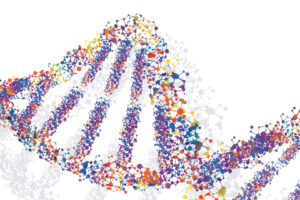Nurses celebrate Adam Fox and Ashley Getta in October 2017.
As Winter Storm Niko barreled across the Northeast in February 2017, flights were cancelled and many schools and offices were closed. Suffering from what he thought was the flu, Adam Fox was awaiting blood work results from his primary care physician, Nivedita Sharma, MD. That snowy day, she called to advise the 52-year-old Jackson resident to go right to the CentraState Emergency Department for further testing.
Meanwhile, in Howell, 23-year-old Ashley Getta was concerned about a bruise on her right forearm that seemed to appear out of nowhere. The walk-in clinic she had visited the day before called with her blood work results, and urged her to go straight to the Emergency Department as well.
At the time, neither Adam nor Ashley had any idea that they were both about to be admitted for a full month of inpatient treatment for acute promyelocytic leukemia (APL), a relatively rare type of cancer of the white blood cells.
Skilled Pathology Team Facilitates Diagnosis
Although Adam and Ashley arrived at CentraState’s Emergency Department at different times that day, each had blood work drawn and sent to the hospital’s pathology department for testing. In both cases, a skilled hematology technician knew something was not right. CentraState pathologists Paul J. Simon, DO, and Karabi Sinha, MD, carefully reviewed the specimens and recognized that the diagnosis in each case could be APL.
“With many different types of acute leukemia, it would be extremely uncommon to see two cases of APL in one day,” Dr. Simon says. “But in the medical field, you always have to trust your instincts and training and be prepared for the unexpected.”
Despite the treacherous weather conditions impacting normal courier schedules, Drs. Simon and Sinha were able to arrange for the blood work to be picked up by an off-site specialty reference lab for confirmation of the diagnosis. In the meantime, they consulted with Jeffrey Silberberg, MD, a board-certified and fellowship-trained hematologist/oncologist on staff at CentraState, to assess the situation and initiate APL treatment.
“APL can interfere with the body’s coagulation processes, putting patients at risk for life-threatening blood clots or bleeding,” Dr. Sinhasays. “If there’s a question of APL, it’s critical to expedite treatment protocols.”
An Extended Course of Targeted Therapy
As unexpected as the pathology results were, the confirmation of an APL diagnosis was even more shocking for Adam and Ashley.
“It was the strangest feeling,” Adam recalls. “One moment I thought I had a bad case of the flu, and the next I was in the hospital for the fight of my life.”
Dr. Silberberg started both patients on a six-week course of daily targeted therapy with the oral medication all-trans-retinoic acid (ATRA) plus an IV medication called arsenic trioxide. Together, these medications specifically target the leukemia cells, causing them to mature and die while the body makes healthy, new white blood cells.
“If APL is caught early and bleeding is prevented, it’s very treatable and is curable in the vast majority of patients,” Dr. Silberberg says. “Targeted therapy with these two medications is a relatively recent advance that can be used in place of traditional chemotherapy. Treatment starts in the hospital with induction therapy, which eradicates most of the leukemia cells. The second step is consolidation therapy, usually as an outpatient, to target any remaining cells that might still be present in the bone marrow.”
While both patients experienced a few side effects of treatment—Ashley had swelling in her optic nerve and Adam was treated for a lung condition called differentiation syndrome—these issues were resolved and managed by other CentraState specialists so that they could continue with their APL protocols.
Brought Together by a Common Bond
Several days after being admitted to the hospital, Ashley learned that she was not alone in her fight against APL. She crossed paths with Adam, who was right down the hall undergoing the exact same course of treatment. They began sending each other little gifts, like puzzles and word game books, and before long a friendship was established.
“It’s so nice to have someone to talk to who’s going through a similar experience,” Ashley says. “Whenever I had a rough day, he would know exactly what to say to make me feel better. We’ve helped each other stay strong.”
As they finish up intermittent courses of consolidation therapy as outpatients, Ashley and Adam keep in regular contact to support each other’s recovery. According to Dr. Silberberg, their prognosis is excellent.
“I’m ready to go back to taking college classes and hopefully do great things,” Ashley says. “I’ve always loved the beach, so I plan to get my diving certification and perhaps one day be a marine biologist.”
Adam is also ready to move on with life, thanks to the treatment he received.
“I couldn’t have asked for better care,” says Adam, who works as a technology executive in New York City. “The teams at the hospital and in Dr. Silberberg’s office have been unbelievable. The nurses were so kind and comforting—it’s clear that the role of caregiver is a special calling for them. I’ve got a second chance at life now, and nothing is going to hold me back.”
For more information about CentraState’s cancer services, call 855-411-CANCER (855-411-2262).





